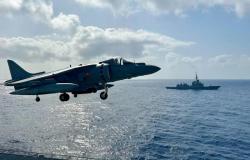
The same Russian military intelligence (GRU) officers who poisoned Sergey Skripal in the UK, belonging to the infamous unit 29155, have been paralyzing American diplomats and agents around the world since at least 2015 with targeted attacks carried out with a secret acoustic weapon, which uses microwaves and ultrasound and causes what is now known as “Havana syndrome” – a sudden illness that causes serious damage to the brain and ear causing severe headaches, loss of balance, in some cases even deafness in one ear (The name was given to the syndrome because a number of US agents and diplomats began to suffer from it in Cuba). But the revelation of an investigation of TheInsider, Der Spiegel and from the TV show “60 Minutes” she is not the only one.
The print can tell an extremely disturbing detail of what would be a serious act of war against the United States: it was already known that – as we revealed in this newspaper – several of the Russian spies of Unit 29155 have entered and exited freely in recent years from the airports of ‘Italy (Milan and Rome), but now we know that two of them had regular Italian visas, and left Italy for at least one of their missions with the acoustic weapon, which took place in Frankfurt.
Naturally, this could greatly embarrass Italy, because Russian attacks with acoustic weapons would be a casus belli with the United States, going back to acts of war against American diplomatic and military personnel. And Italy would find itself in the uncomfortable position of not having adequately monitored those who enter and exit our borders.
To start, TheInsider discovered that the travels of some Russian spies of this GRU unit coincide with the chronology and geography of some cases diagnosed in US diplomats with “Havana syndrome”, and two victims of two of the attacks (which occurred in Frankfurt and Tbilisi) have recognized two employees of unit 29155 before or immediately after the attack and identified them from photos. However, from their passports we also discover that two of the Russian attackers of the “Havana syndrome” had Italian visas and used Italy as a favorable entry hub into the European Union. On September 25, 2015, Denis Sergeev (fictitious name Sergey Fedotov) flew from Moscow to Milan. Several months earlier he had obtained a multi-entry Schengen visa issued by Italy, which offered him easy access in the absence of border controls, at that time, between 26 European countries and also Switzerland. But whatever he was, he had preferred to enter the common European space through the country that had issued him the visa. That is, Italy. Another – Colonel Evgeny Kalinin – entered from Hungary, flew to Budapest posing as a Russian diplomatic courier. Another, Igor Gordienko, entered from Paris (coming from Moscow) on a Schengen visa issued by France.
On 11 October three other Russian “tourists”, actually members of unit 29155, entered Europe all traveling under false identities: the leader, Colonel Ivan Terentiev, deputy of the unit commander Andrey Averyanov, was also a minute of a comfortable Italian, and flew from Moscow to Milan. His adjutant, Lieutenant Colonel Nikolay Ezhov, flew from Moscow to Vienna, also on 11 October.
To date, there has been strong official US reluctance to talk about the many cases of Havana syndrome among American agents and diplomats – especially those with a background of successful operations involving Russia. Some of the affected officials complain of having been abandoned without protection for a long time. One explanation could be, according to one of the authors of this investigation (Roman Dobrokhtov), that the revelations could have a very large impact, because obviously physically attacking US diplomats and agents is equivalent to an act of war, and can be considered casus belli. And of course, if Washington were to acknowledge that Americans around the world have been physically attacked by Russian intelligence men, the consequences could be unpredictable.
Among other things, according to documents published by TheInsider, those same men from GRU unit 29155 who were in and out of Italy were developing what they call “acoustic weapons,” that is, weapons based on the use of microwave energy aimed at human beings. Anatoly Chepiga and Alexander Mishkin (Skripal’s two poisoners) had spent several days in Milan a few years earlier, in 2015, before leaving for Geneva. As well as Sergeev (the leader of the trio). Now we learn that the same GRU Scientific Academy from which Mishkin graduated (and where GRU doctor Sergey Chepur and member 29155 Kovalchuk work) – had issued a document ordering to study the consequences of the “Havana syndrome” .
Sergeev (as Sergey Vyacheslavovich Fedotov) was also listed as having boarded a 3pm flight on 4 March 2018 from London to Fiumicino – just hours after former MI6 Soviet spy Sergey Skripal and his daughter Yulia collapsed , poisoned, in Salisbury in Wiltshire, England. The next morning, he is in Moscow, at the “Conservatory”, the GRU military school. But this is already history.





